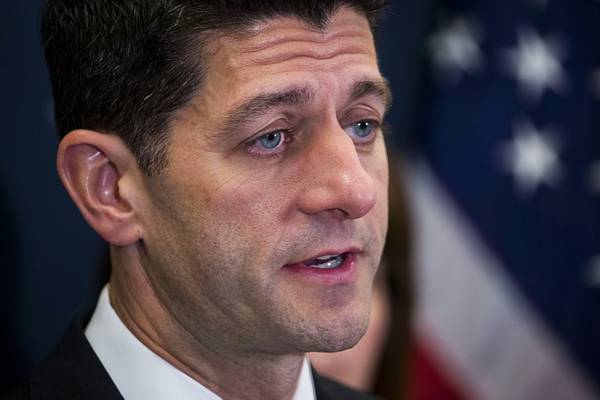WASHINGTO — House Speaker Paul Ryan on Wednesday said that deporting hundreds of thousands of young immigrants brought into the country illegally is "not in our nation's interest," as he and President Donald Trump prepared to huddle with top Democrats to try to hash out a legislative fix.
Speaking in an AP Newsmaker interview, Ryan said he believes the president "made the right call" when he announced that he would give Congress six months to figure out what to do with former President Barack Obama's Deferred Action for Childhood Arrivals program before dismantling it. DACA has given nearly 800,000 young people protection from deportation and the right to work legally in the country.
"I wanted him to give us time. I didn't want this to be rescinded on Day One and create chaos," Ryan said, arguing the time would allow Congress to "come up with the right kind of consensus and compromise to fix this problem."
As part of that effort, Ryan will be meeting with the House's top Democrat, Nancy Pelosi, on Wednesday evening, before Pelosi heads to the White House for a dinner with President Trump and Senate Democratic leader Chuck Schumer. The leaders were expected to discuss DACA and other issues, according to congressional aides and the White House. Trump is also scheduled to meet with a group of moderate members of Congress from both parties Wednesday afternoon. Trump also had dinner Tuesday night with Republican and Democratic senators to talk about his planned tax overhaul.
The get-togethers come amid new signs that there may be room for compromise on the thorny issue of immigration, which has been vexing lawmakers for years. Trump, who was deeply disappointed by Republicans' failure to pass a health care overhaul, has shown a new willingness to work with Democrats in recent weeks, despite railing against them as "obstructionist."
Last week Trump infuriated many in his party when he reached a three-month agreement with Schumer and Pelosi to raise the debt ceiling, keep the government running and speed relief to states impacted by recent hurricanes. Both Pelosi and a top White House staffer also indicated Tuesday that they were open to a compromise on border security to expedite legislation protecting DACA recipients.
"This was something that the president talked about on the campaign trail, of being a good deal-maker and being able to sit down with members of both sides," said White House spokeswoman Sarah Huckabee Sanders, of Trump's new appetite to working with Democrats. "This isn't new and people listened and heard the president and certainly supported him, and that's why he's here today."
White House legislative director Marc Short said Tuesday that, while the president remained committed to constructing a southern border wall, funding for the wall did not necessarily need to be linked directly to the "Dreamers" issue.
"I don't want us to bind ourselves into a construct that makes reaching a conclusion on DACA impossible," Short said at a Christian Science Monitor breakfast.
Democrats have been adamant that they will not accept the wall in exchange for permanent protections for DACA recipients, but Pelosi indicated Tuesday she would be open to new border security measures of some kind.
"We always want border stuff, so that's not a problem," Pelosi told reporters at the Capitol. Still, she said: "We've been very clear. There is no wall in our DACA future."
Ryan, meanwhile, said he's been having conversations with members to come up with a compromise that is likely to include border security enhancements.
"I do believe that kicking these 800,000 kids out to countries that they've probably not been to since they were toddlers in countries that speak languages they may not even know is not in our nation's interest. So I do believe that there's got to be a solution to this problem. But at the same time, I think it's only reasonable - it makes perfect common sense - that we deal with the problem that was the root cause of this, which is we do not have operational control of our borders," he said, adding: "This is a broken system that needs to be fixed."
Prior to becoming House speaker, Ryan had a long record of pushing for immigration reform, including supporting a path to eventual citizenship for all 11 million immigrants estimated to be living in the U.S. illegally, and particularly those often referred to as "Dreamers." Asked Wednesday, though, Ryan declined to say whether he still believed those covered by DACA should have the opportunity to attain eventual citizenship.
Associated Press writers Erica Werner and Ken Thomas contributed to this report.

